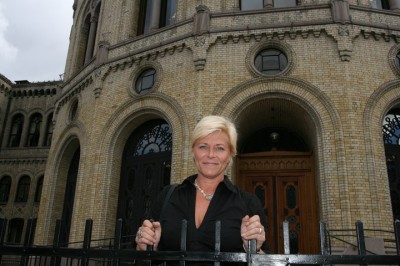Efforts by Norway’s new conservative government to “modernize” the state wine and liquor monopoly (Vinmonopolet), and ease some restrictions on its sales, were met by immediate opposition over the weekend. Not even Vinmonopolet officials, worried about what they see as the “tax-free threat,” think extra sales days will help them maintain control over the wine and liquor market in Norway.

The government’s proposal to expand opening hours and allow Vinmonopolet’s sales outlets to remain open just five extra days a year set off battle cries Sunday from, among others, anti-alcohol groups and labour unions representing Vinmonopolet employees. Nor are Vinmonopolet bosses enthusiastic about the proposal, worrying more about the loss of sales to airport tax-free shops.
Siv Jensen, leader of the Progress Party and now Norway’s finance minister, said on Sunday that she and her government colleagues just want to make life “a bit simpler for folks.” Jensen confirmed that the government planned to put forth a proposal on Monday to let Vinmonopolet remain open on the days before Christmas, New Year’s Day, Easter Sunday, Whitsund (pinse) and on election days.
Until now, outlets of the state liquor monopoly have been locked up not only on Sundays but also on December 24th (Christmas Eve), December 31st (New Year’s Eve) and the days known as påskeaften, pinseaften and valgdager. They float in accordance with the calendar, and are not legal holidays themselves.
Restrictive alcohol traditions in Norway, however, have led to the mandatory closure of Vinmonopolet outlets on the Saturdays before Easter Sunday and Whitsund, for example. In the case of Easter, which includes four legal holidays in Norway (Holy Thursday, Good Friday, Easter Sunday and Easter Monday), consumers in Norway have been legally banned from buying wine or liquor for five days in a row.
That’s what the new government wants to ease, and both Jensen’s party and the Conservatives will probably win support for their proposal in Parliament from the Liberal Party (Venstre), giving them the needed majority to pass it. Labour Party politicians have also signaled their support. Jensen says it’s all about “modernizing” the state monopoly’s currently regulated opening times: “We believe it will simplify things to at least make it possible (to stay open before holidays) … and it will simplify distribution of the monopoly’s goods through the post and in the districts.”
Other politicians, including some from the regulatory-minded Center Party, and anti-alcohol groups quickly claimed that expanding opening hours, even by just five days a year, will increase alcohol consumption in Norway. Labour unions claimed that Vinmonopolet employees have a right to be off on those days in their current contracts.

Jensen was unconvinced, noting that an easing of restrictions on liquor sales has long been part of her party’s political platform, which also has called for dissolution of the monopoly and allowing beer and wine sales in grocery stories. She said the new proposal to at least expand opening days was also a “direct follow-up” to the negotiations her party and the Conservatives had with support parties Venstre and KrF (the Christian Democrats), to simply the monopoly’s operating rules.
Even though tens of thousands of Norwegians regularly stock up on much cheaper wine and liquor at tax-free stores when they go traveling, or simply by driving over the border to Sweden, support for Vinmonopolet itself remains surprisingly high in Norway among a majority who enjoy its wide selection of wine, for example, and the quality of both its goods and service. Calls continue, though, for the government to lower the punitively high taxes on wine and liquor, to reduce the amount of cross-border sales and tax-free sales.
Newspaper Aftenposten reported last fall that for the first time in 17 years, Vinmonopolet faced a reduction in sales and profitability. Even though the entire purpose of Vinmonopolet is to control sales of alcohol in Norway, the monopoly’s management was sounding the alarm, calling not so much for lower taxes or tax-free quotas themselves but rather for permission to open more outlets and establish opening hours in line with local needs. Vinmonopolet’s management also wants to expand internet sales and be able to show pictures of their bottled goods, something that’s also not allowed at present because of strict laws against advertising alcoholic beverages.
Paradox
Kai Henriksen, Vinmonopolet’s chief executive, told Aftenposten in October that he didn’t think permission to open up outlets on the extra five days a year would increase sales, and may only increase costs. Rather, in what appears to be a paradox, Vinmonopolet boosters want to reverse its sales decline by increasing its market share, through winning business back from Sweden and tax-free competitors.
Henriksen sees the tax-free sales at Norwegian airports as the biggest threat to Vinmonopolet’s position, not least since Norwegians are traveling more than ever and they can buy tax-free goods upon landing, before they clear customs. Tax-free sales are a major source of income for the airports, and the sales on arrival have sent tax-free revenues soaring. Henriksen doesn’t think taxes or tax-free quotas for Norwegians will be lowered, so he wants to seek other means of tackling the tax-free threat.
Some have proposed that Vinmonopolet itself should simply be allowed to take over tax-free sales at Norway’s airports, giving it even more of a monopoly on wine and liquor sales than it already has. Others have proposed that tax-free sales be banned entirely.
That would likely just send even more Norwegians over the border to Sweden’s much cheaper version of Vinmonopolet (Systembolaget), or lugging more heavy bottles home in their suitcases. Debate over the government’s initial stab at liberalizing the monopoly was expected to be lively.
newsinenglish.no/Nina Berglund

